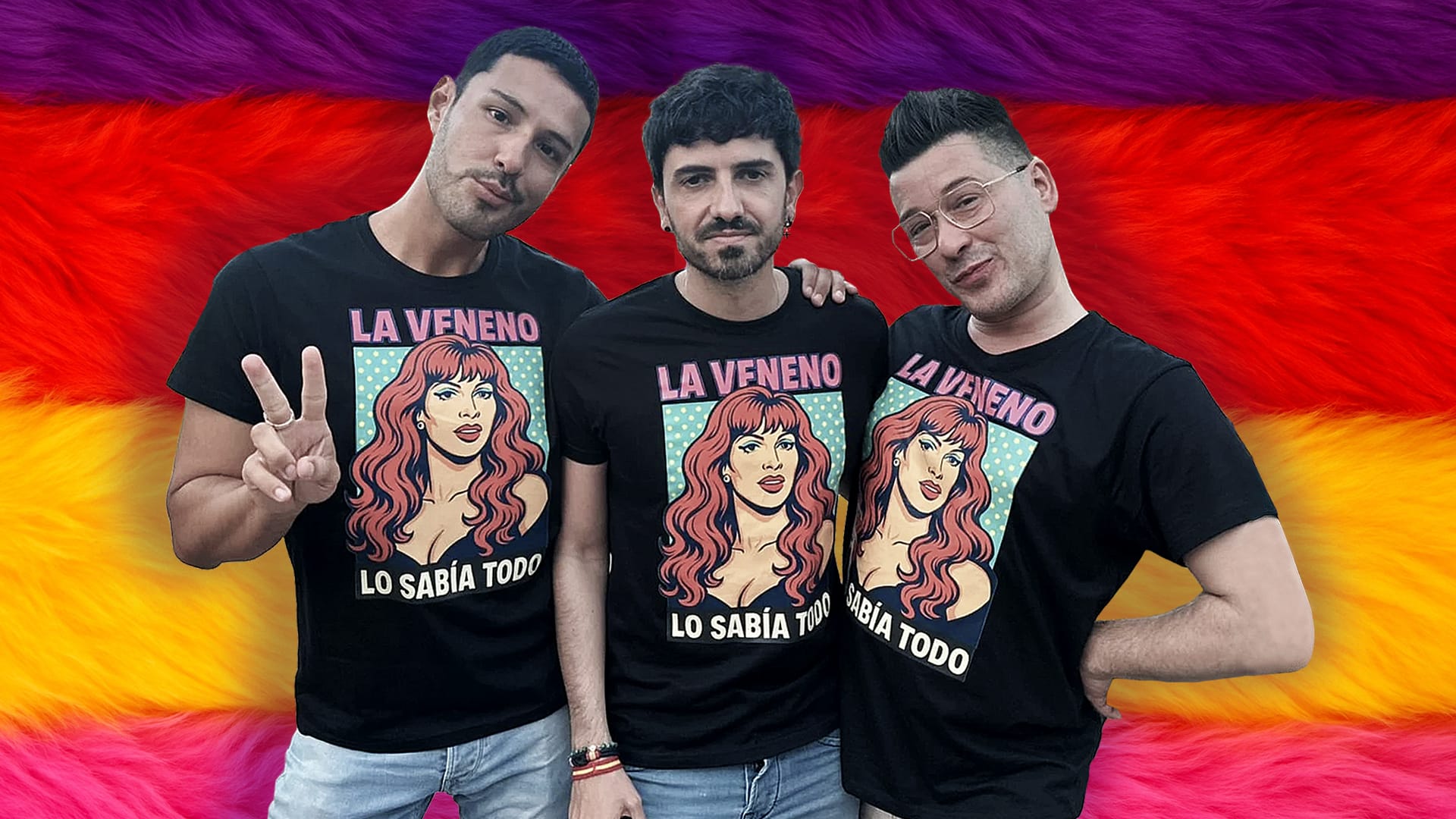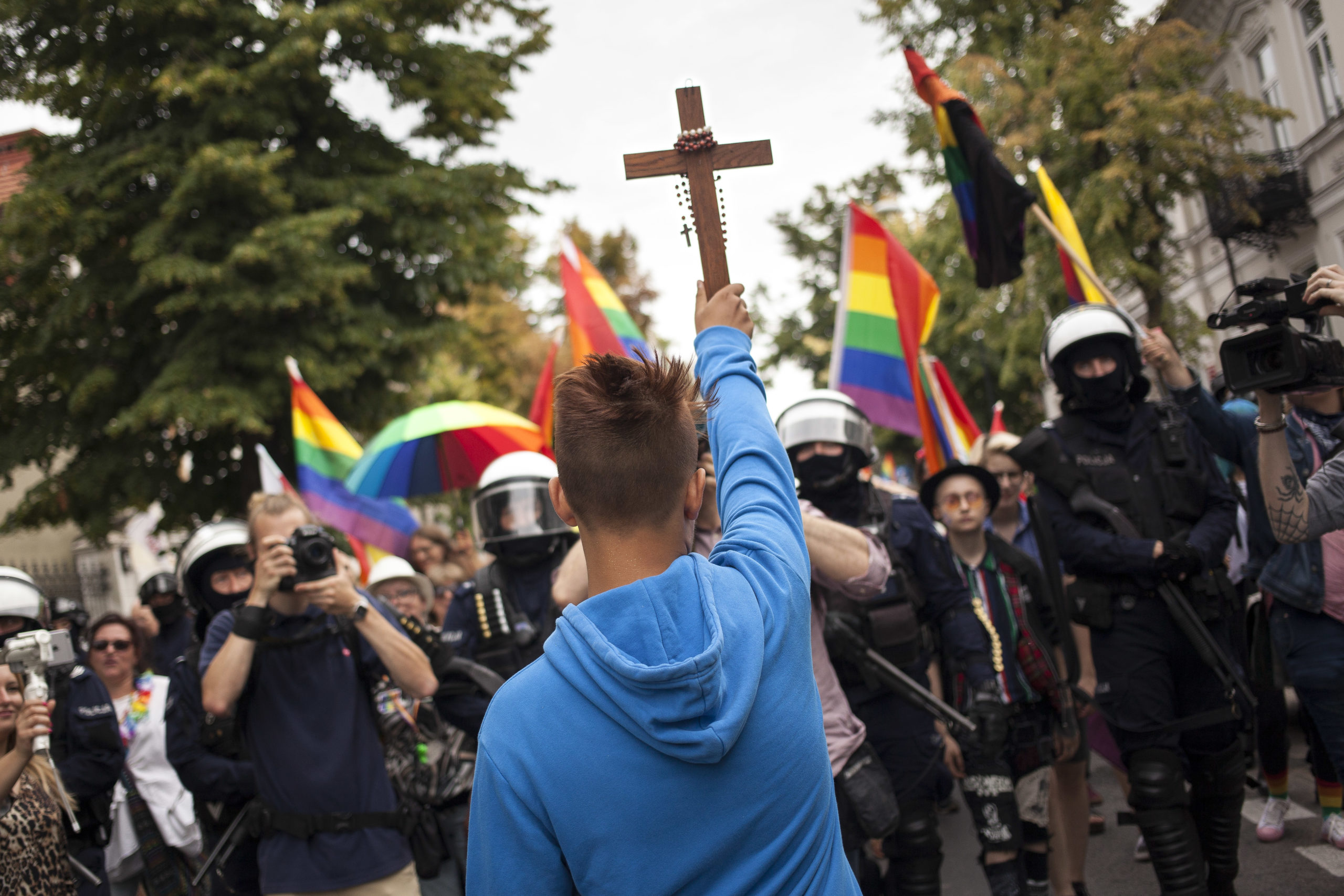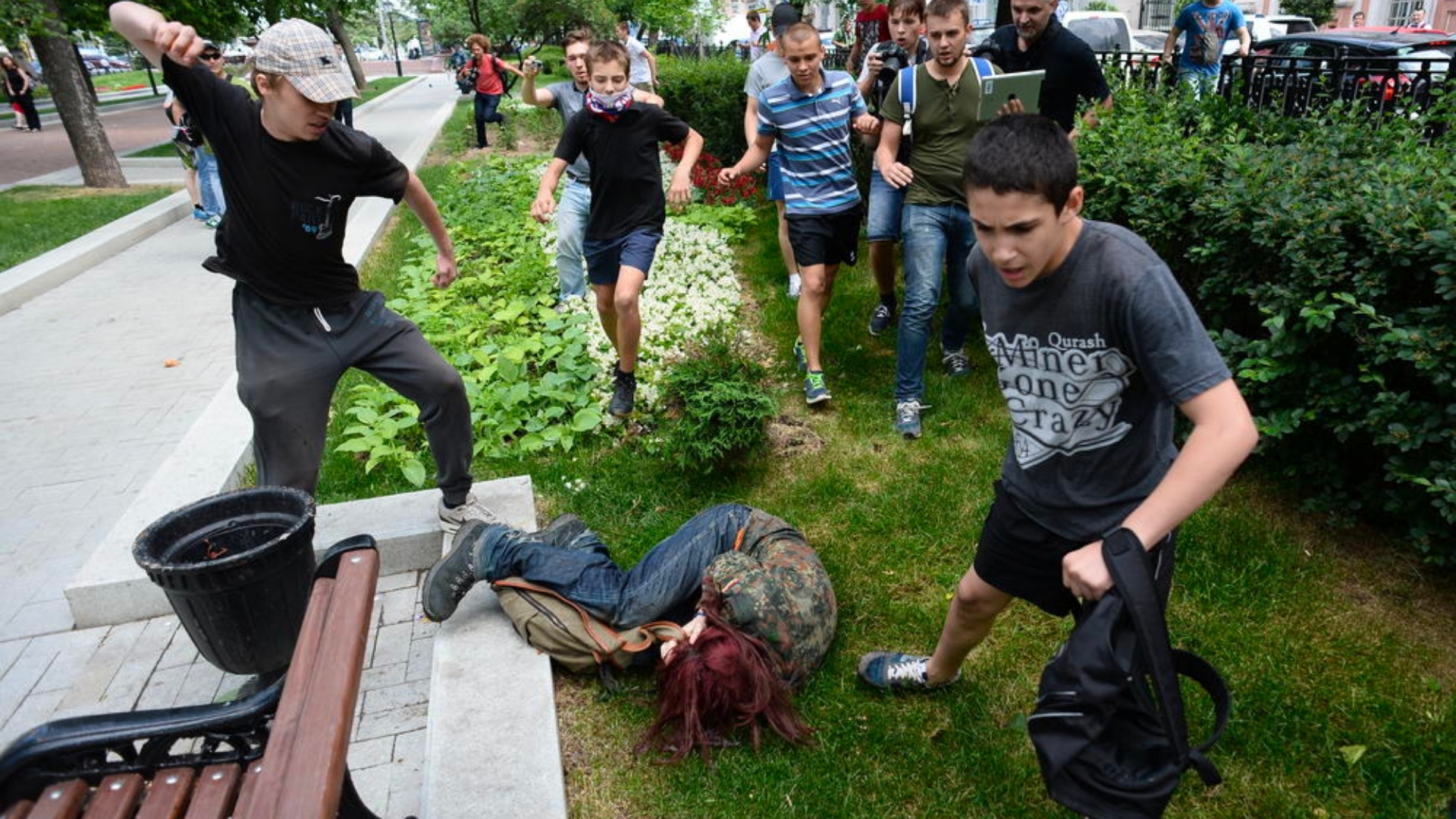“Islam keeps me up at night,” says Carlitos de España, sipping beer in Barcelona’s gay-friendly Eixample district. The 41-year-old YouTuber, who moved here from Bolivia 17 years ago, has become one of Spain’s most prominent gay far-right influencers. “I’m very much against Islam advancing here in Europe,” he says. “They want me dead, so I can’t be inclusive and I have the right to defend myself by any means possible.”
Together with other YouTubers who share similar views, Carlitos formed Las Marifachas, a politically provocative trio whose name combines a crude Spanish slur for gay men with a derogatory term for fascists. The other Marifachas include InfoVlogger, who has almost half a million followers, and ‘Madame in Spain’, a drag queen from Alicante in southern Spain. Together, Las Marifachas are building an unlikely bridge between Spain’s LGBTQ+ community and the far-right Vox party.
Vox’s anti-migrant messaging connects it to the values of a broad swathe of right wing groups across the world. In context, Las Marifachas views represent and reflect a trend that has been growing across Europe, from France to Germany to the U.K., for a decade now – the alliance between some gay men and far-right parties, brought together by their shared hostility towards immigration, particularly Muslim immigration.
Gay conservatism is not new, of course. Its roots go back to the 1950s and the leadership purge at the once progressive, Communist-inspired Mattachine Society. In 2024, JD Vance felt confident enough to predict that he and Donald Trump would win the “normal gay guy vote.” He was wrong. An unprecedented proportion of LGBTQ voters voted Democrat, even as more voters than ever identified as LGBTQ. In Europe, though, immigration has been a more pressing concern for some LGBTQ voters, driven by misinformation and polarizing online content about homophobic immigrants. It is a widespread fear.
That’s why in May, Las Marifachas traveled to the Romanian capital Bucharest, livestreaming election reports from the headquarters of the populist Alliance for the Union of Romanians (AUR). The election was being rerun after far-right candidate Călin Georgescu’s victory last November was annulled due to allegations of Russian interference. The controversy meant the Romanian election had become a right wing cause célèbre. Even ‘Make America Great Again’ representatives had traveled to Bucharest to throw Donald Trump hats into crowds of cheering supporters.
Part of this global right, Las Marifachas had to be in Bucharest, crowdfunding their first “international mission” and ignoring the perplexed glances from local, flag-waving AUR supporters whose party has said it opposes “homosexual marriage” and “publicly-funded trans-sexual surgery and other Freudo-Marxism-inspired ‘innovations’ meant to fluidize, relativize, and eventually abolish the traditional moral paradigm.”
Still, whatever AUR’s professed anti-LGBTQ beliefs, Madame in Spain insists Muslims pose a greater threat. “I can’t understand how the LGBTQ community, feminists and this damn woke movement can support Islam,” Madame says. “Because they don’t come to integrate, they come to destroy us.”
Back in Spain, Las Marifachas have been promoting their new song, ‘Bocadillo de jamón’ (literally, ham sandwich), a dig at Muslims who don’t eat pork. “In every Spanish home,” reads the title of one of the Marifachas’ YouTube videos, “there must be a leg of ham.” It’s the kind of sentiment that increasingly resonates with Spanish voters.
After a surprisingly mediocre showing in the 2023 Spanish general election, recent polling shows that Vox is regaining momentum. It is currently the most popular party in the country among men and among younger demographics, with 27.9% of 18-24 year olds and 26% of 25-34 year olds saying they will vote for Vox in the next general election, according to a poll in Spanish newspaper El Pais. Though it is not until 2027, Elon Musk has already declared on X that “Vox will win the next election.”
Musk’s support echoes that of Donald Trump, with Vox leader Santiago Abascal securing a spot alongside Italy’s Giorgia Meloni, Hungary’s Viktor Orbán and Argentina’s Javier Milei as MAGA’s most prominent overseas supporters. While Vox currently holds just 33 seats out of 350 in the Spanish parliament, its influence on the national agenda far exceeds its political presence.
In September, at ‘Viva Europa’, a Vox conference, attended virtually by Meloni, Orbán and Milei, Abascal wore a white ‘Freedom’ t-shirt in tribute to Charlie Kirk, the prominent MAGA activist, who had been assassinated just days earlier while speaking at Utah Valley University. Delegates embraced Kirk as a martyr for free speech. “Some point and others shoot,” Abascal said. “Since censorship isn’t enough for them, they resort to murder.” He was also quoted as saying, the left “do not kill us for being fascists – they call us fascists in order to kill us”.

Eorope’s homonationalist wave
In contrast with much of the rest of Europe, the Spanish government has been welcoming of immigration, acknowledging its economic advantages and the need for immigrants in an ageing country with one of the lowest birth rates in the world. But this year Spain overtook Germany as the top EU asylum destination, and anti-immigration sentiment has been growing.
It reached boiling point this summer. On July 9, a 68-year old man in the southern Spanish town of Torre-Pacheco — where about a third of its 40,000 inhabitants are migrants — was brutally beaten up by three young men. Far-right groups were quick to use the beating as an opportunity to spread fake videos and misinformation on a Telegram group called “Deport them Now Spain”. Among the racist, anti-migrant invective were calls to “hunt” down North Africans and “reunite them with Allah”.
The violent clashes between protestors and police echoed riots in other European cities in recent summers, including last year in the United Kingdom after the killing of three children in a mass stabbing was falsely blamed on Muslims and asylum seekers. Using a new tool called FARO, developed to detect hate speech, the Spanish government found that the Torre-Pacheco incident fueled a wave of 33,000 messages containing hate speech towards immigrants posted in a single day.
When I asked Carlitos, of Las Marifachas, about the role of social media in driving real-life violence against immigrants in Torre-Pacheco, he said that it was not the Telegram group that was the problem. People on the streets, he argued, now feel empowered to act. “I do generalize,” he said, “that the Islamic religion is homophobic.”
It is a belief many LGBTQ+ voters across Europe have shared. In France, Marine Le Pen, leader of the far-right National Rally party (RN) received strong support from gay voters during her runs for president. In 2017, polling showed that Le Pen was, remarkably, more popular among LGBTQ voters, which make up 6.5% of the French electorate, than she was with straight voters. This, despite her party’s traditional opposition to LGBTQ+ rights.
A 2024 study from the London School of Economics showed that in the U.K., a growing number of people profess progressive views on homosexuality alongside anti-immigrant sentiment, a combination that became prominent during the Brexit debates back in 2016. And much more recently, in the run-up to the German elections in February this year, a survey by the LGBTQ dating app Romeo showed that the majority of the 10,000 people polled favored the far-right Alternative for Germany, led by the openly gay Alice Weidel.
In the Netherlands, the late-1990s rise of Pim Fortuyn, a gay academic turned hardline anti-immigrant, was an early example of the coming together of progressive views on homosexuality with conservative views on immigration. Dutch scholars have tracked how Fortuyn’s framing of Muslim migration as a threat to Western openness and liberalism changed populist politics.
The above are all examples of “homonationalism”, a term coined two decades ago by Jasbir Puar, a professor of women’s and gender studies at Rutgers University. Her work describes how far-right actors instrumentalize LGBTQ rights to spread anti-immigrant messages by creating a binary narrative in which Islam is pitted against homosexuality. Originally focused on post-9/11 America, European scholars have since used Puar’s framework to document similar patterns in multiple countries.
“Across Europe, it has proven effective for promoting anti-immigrant policies and gaining gay voters,” says Guillermo Fernández Vázquez, a political scientist at Madrid’s Complutense University. “While the LGBTQ community has always been told that the far-right is a threat to their rights,” he told me, “actors like Las Marifachas argue that ‘no, it’s actually the immigrants, so the far right is not your enemy, it’s your main defender.'” The far-right becomes, paradoxically, the main ally of European gays because, he adds, “they claim to be the only ones tough and determined enough to kick out the supposed aggressors.”
The algorithm advantage
Social media platforms play a crucial role in amplifying this messaging and making once obscure political positions mainstream, especially since companies like Meta eliminated their fact-checking operations. Far-right content is inherently more compatible with social media algorithms that prioritize confrontational and populist material, explains Petter Törnberg, a University of Amsterdam professor studying social media polarization.
Las Marifachas are part of Spain’s “Fachatubers” — a portmanteau of “facha” (fascist) and YouTuber. These creators have mastered how to use coded language to evade detection while conveying extremist messages.
Much of Las Marifachas’ content discusses violent crimes in Spain, emphasizing assaults on LGBTQ individuals and the nationalities of the alleged perpetrators. “This discourse criminalizes all immigration and has nothing to do with LGTBIQ+ rights or wellbeing,” says Francesc Álvarez, head of the Barcelona-based advocacy group Ram de l’Aigua. “Right-wing groups exploit the false premise that all migrants are homophobic and no LGBTQ immigrants exist, when Spain actually serves as a destination for those fleeing persecution over sexual orientation.”
Las Marifachas distance themselves from the LGBTQ movement, which they claim is “woke” ideology separate from homosexuality. Both Madame and Carlitos describe themselves as deeply religious, promoting Christian and traditional family values. They oppose homosexual adoption and don’t object to Vox’s anti-trans and anti-LGBTQ policy proposals.
“We’ve contributed our grain of sand,” says Madame, “by uncloseting a lot of homosexuals who didn’t dare say that they support the right.” According to Guillermo Fernández Vázquez, “the primary function of this type of group, apart from surprising and entertaining, is to break things apart — to disperse, to fragment.” In the medium and long term, he adds, “it’s a strategy to ensure that there won’t be a LGBTQ community that’s united against the far-right.”
Historically, he said, “the far-right has not exactly been supportive of LGBTQ rights, but when it turns out that it can benefit from LGBTQ support in pursuing anti-liberal, anti-Muslim, anti-migration aims, it is happy to adopt those values.”
On 23 September, Donald Trump delivered an incendiary speech at the United Nations general assembly hall in New York, castigating European countries for failing to “stop people that you’ve never seen before, that you have nothing in common with.” It’s an anti-immigration message that should, arguably, resonate with Las Marifachas, a message that Vox appears intent on delivering to the Spanish electorate.
On October 11, Las Marifachas plan to be in Miami. It is the next stop, after Romania, on their “international mission” to get people to see things their way, to persuade people to drink from their fizzy cocktail of anti-immigration rhetoric, support for the pro-MAGA Vox party, and current-day homonationalism. Their goal in Miami, as they talk about censorship in Spain, will be to persuade their audience that the future is best served through an alliance with the far-right, in lying with the devil you know. Is fear proving stronger than traditional solidarity among marginalized groups.

















